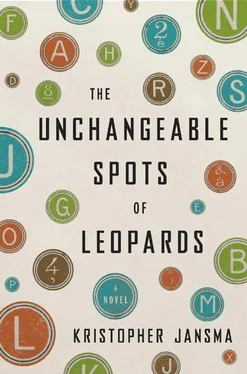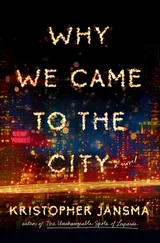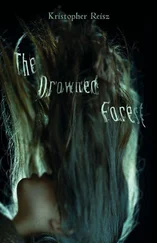“That table’s going to break.”
“In case you were wondering,” she said, “the time to lose your nerve would have been before you jumped me out on the golf course.”
“ I jumped you ?” I began to protest, but saw that this wouldn’t help my case. I set the hot chocolate down and, slowly, carefully, got onto the table with her. She seemed distant again. Back to being the way she was before.
“You seem different now,” I said.
“I am.”
“Why?”
She shrugged and looked at the painting impassively. “Because I don’t like me, that way.”
“I do,” I said.
“I know,” she answered.
From where we stood, the golden woman was just out of arm’s reach.
“That’s real gold,” I informed her.
“No kidding.” She didn’t appear so impressed, but she couldn’t take her eyes off it either. “Touch it.”
“You’re crazy,” I said. “That’ll leave my fingerprints.”
“On something beautiful. Something that will stay beautiful forever.”
Slowly I reached out and pressed a finger to the painting. It crunched, just slightly, under the pressure of my fingertip. When I pulled away I saw a soft circular shadow where I’d touched it, just to the left of the woman’s face. My finger faintly glittered with flecks of gold. It had come off so easily.
We stared at it for another moment. Then she said, “Write me something.”
“I’m not really a writer,” I explained. The last thing I’d written that wasn’t for school had been illustrated, badly, and I’d been about eight years old.
“Yes, you are,” she said simply. “You’ve been making stuff up since you first opened your mouth. And you’ve been loving it. So just write it all down. Write about tonight. Quick. Before you forget anything.”
“Why?”
“Because,” she said, turning away from the painting at last. “You could get hit in the head with a golf club tomorrow, and then it would all be gone forever.”
“That’s ridiculous,” I said.
“Not that ridiculous. Apparently.”
Standing there in the silent café, I wanted to tell her that if I got hit in the head and lost every brain cell but one, that brain cell would be the one that remembered that night. But, of course, I couldn’t think of words that good, just then. So I said nothing. And silence said what my words couldn’t.
“All right. I’ll do it. If you want,” I finally managed.
The corners of her mouth began to shake. She bit her lower lip. Her nostrils swelled slightly as she breathed in, sharply. And then, at last, a strange and slow smile spread across her face.
“Why are you smiling?”
“Because,” she said. And for a moment I thought that’d be it. But then she finished: “ You’ll never forget me.”
Then she kissed me one more time and stepped down off the table. Before I could say anything, she walked out of the café, toward her mother and her ball and her world, and I remained there in mine, sitting on the table looking up at the tiny smudge we’d made.
Writing, at its best, is a lonely life. . For he does his work alone and if he is a good enough writer he must face eternity, or the lack of it, each day.
— ERNEST HEMINGWAY
Julian McGann was the only other boy in my freshman Fiction & Poetry class, which met at 8:30 in the morning in a forgotten sub-basement of Abernathy Hall. While the balding Professor Morrissey squawked about Hawthorne and Longfellow over the clanking of Berkshire College’s infamous steam radiators, Julian sat at the far end of the conference table and, twice a week, passed the ungodly early hour watching the leaves pile up against the raised windows. The girls spent the class mostly staring at the brown freckles that bridged Julian’s nose. He always sat up perfectly straight. His reddish hair was a perfectly kept mess. I assumed Julian was a slacker, since he rarely spoke or wrote anything down, and I was certain that he would never be a real writer, like me.
The first story of Julian’s that I ever read was in this class. His slim piece, “The Thirty-Third Winter,” had fluttered weightlessly when passed across our long table, unlike my story, “The Gravity in Durham,” which had thudded meaningfully in front of each student, clocking in at a far more impressive twenty pages. “The Gravity in Durham” was about a rich girl who invites a poor boy, at the eleventh hour, to substitute for the Homecoming king in the town parade, after the real king is hit by a truck. I’d based it on taking Betsy Littleford to her debutante ball, but I’d changed around the names and basic details. Even though I knew no one else at Berkshire College and none of them knew me, I still imagined someone might have read the newspaper stories about Billy’s accident, and they’d then despise me for mining his traumatic brain injuries for literary gold. It seemed wrong, especially when I remembered I was at Berkshire College only due to a generous scholarship from the Briar Creek Country Club, arranged by Mrs. Littleford. She’d never said anything explicitly, but still I had the feeling that it was my silence she was really buying.
Moreover, I didn’t want anyone to know where I was from, exactly. Not that I was embarrassed per se … I simply had never been anywhere before where nobody knew me, knew my mother, knew of my father’s absence — knew my life story. The only other time had been when I’d masqueraded as Betsy’s blue-blood date, the Princeton-bound Walter Hartright — that same too-short night when my fictions first earned me a ticket into the inner circle. There, at college, I once again felt as though I’d touched down on another planet, and with each successive day I grew more convinced that I’d suddenly be identified as an alien and sent back from whence I came.
“‘Tell all the Truth but tell it slant—’” Professor Morrissey proclaimed, as I returned my attention to the Emily Dickinson poem we were meant to be scanning. “‘Success in Circuit lies / Too bright for our infirm Delight / The Truth’s superb surprise. / As Lightning to the Children eased / With explanation kind / The Truth must dazzle gradually / Or every man be blind—.’”
As the rest of the class picked out tetrameters and iambs and other smart-sounding things, I thought about the Portrait of Colette Marsh back home, dazzling in its slant of light. I thought about the little smudge I’d left behind. Tell the truth , I wrote in large letters at the top of my notebook. But tell it slant. It sounded profound… I just didn’t quite know what it actually meant. I raised my hand a nervous fraction, but Morrissey was busy outlining rhyme schemes on the board: A-B-C-B… D-E-F-E… I looked over at Julian, staring up at the leaves outside with a vaguely amused smile. Did he know what it meant? I was sure that he must. My hand went down again.
After Professor Morrissey ended our class that morning, I walked out across the dew-drenched quad with Shelly, a frail girl whose veil of dark hair seemed to pull her head earthward. She’d read my whole story during class, and as I bought her a cup of burned cafeteria coffee, she let loose a surprising deluge of jumbled compliments. I’d never had anyone read — let alone lov e — the things I’d written, and perhaps it was the coffee, but I found myself warmed by a gentle, acidic sensation. By evening I had returned the favor and read her workshop piece, plus another of her stories. Both were about death and both involved highly disturbing sex scenes. Shelly invited me to stay over, as her roommate was visiting an out-of-town boyfriend. I passed a nervous hour trying not to crush her in her dark-sheeted bed, under the watchful eyes of a larger-than-life-size poster of Edgar Allan Poe.
Читать дальше











